The Abortion Pill Underground
Since Roe was overturned, thousands of people in red states have found a way to get an abortion—often thanks to providers operating at the edge of the law.

When Kay found out she was pregnant at the end of last year, she knew three things clearly. “I was poor and I had an unwanted pregnancy and knew I couldn’t afford a standard abortion for hundreds of dollars,” she told me. A 29-year-old student already raising one child, Kay lives in Texas, where abortion is banned. The nearest clinic she could find was at least a 12-hour drive away. But Kay thought there might be another option. “I went to Google and started searching if it was possible somehow to receive abortion pills through the Internet.”
It was not only possible; it was much easier and more affordable than Kay had expected. She found online services that offered to ship the same medications that were available in clinics right to her doorstep in Texas for $150 or, if she couldn’t afford that, for free. It seemed so simple that Kay thought it might be a scam. “I was scared I would wait for the pills and they wouldn’t work when I got them,” she said.
Kay turned to the online message board Reddit, where scores of people were posting about their experiences with telemedicine abortion clinics and activist-run support networks like the ones Kay had found. The posts confirmed that these services were indeed legit and that they even delivered pills to red states. Some of the services the posts described—Aid Access, Abuzz, and the Massachusetts Medication Abortion Access Project (The MAP)—are operating under new “shield” laws in blue states that protect providers who ship abortion pills to states where abortion is banned. These laws have revolutionized the abortion-access landscape over the past year. Other groups mentioned on Reddit, like Las Libres and We Save Us, are run by activists who operate outside the formal medical system. But whether they were run by licensed clinicians or not, these services all promised to lead to the same result: In a matter of days, pills to end Kay’s pregnancy would arrive at her door in a discreet package, like a gift from a friend.
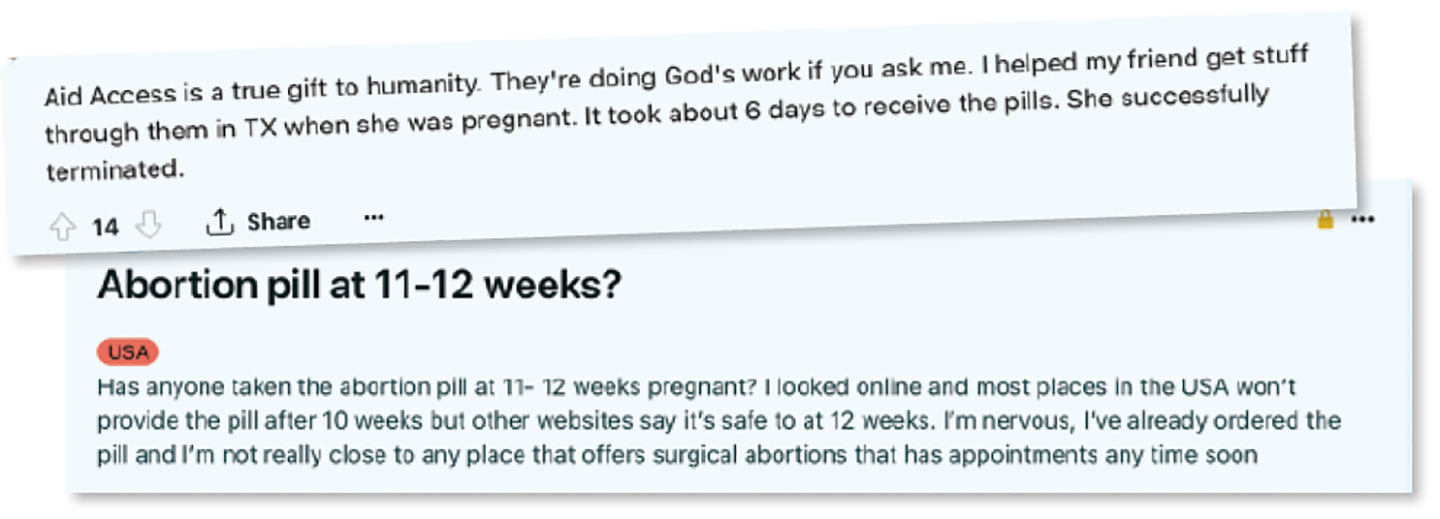
Combing through the Reddit posts, Kay saw that Aid Access, a service started by the Dutch doctor Rebecca Gomperts, had the most reviews. Twenty-five years ago, Gomperts set sail for international waters off the coast of countries like Ireland and Portugal in order to provide abortions on board and draw attention to restrictive laws. In 2005, she launched Women on Web, prescribing abortion pills from Europe for people around the world. After getting inundated with requests from the United States, she founded Aid Access in 2018 to serve people here.
During a recent interview via Zoom, Gomperts sat in her apartment in Amsterdam, her 17-year-old son off camera in the background. Her hair, swept back from her face, has gone white. “Oh, that’s a long time back you’re asking me to go!” she said when I asked her to reflect on the arc of her career, from her start as a resident doctor on the Greenpeace ship Rainbow Warrior II, when she witnessed the suffering caused by the lack of access to safe abortion around the world, to the decades she’s spent getting abortion pills into people’s hands. “The more you know about it, the more incomprehensible it is that it’s not allowed,” Gomperts said. Thirty years ago, an estimated 115,000 to 204,000 women worldwide were dying each year from unsafe abortions. Now, with abortion pills more widely and cheaply available, that number has fallen dramatically. “Abortion pills are everywhere now,” she said.
Still, Gomperts acknowledged, there is a pervasive “How can this be real?” response when people like Kay find out they can get abortion pills from a licensed clinician for free. Gomperts stared into the distance for a moment before turning back to the screen with a wide smile on her face. “I think that’s one of the most beautiful things [about] what we did,” she said. “It’s for free for people that cannot afford it, and we don’t ask for proof that you don’t have any money in your bank account. It’s trusting women.”
Back in Texas, Kay filled out a medical form on the Aid Access website. She responded to an e-mail asking her to confirm her information. Then she waited.
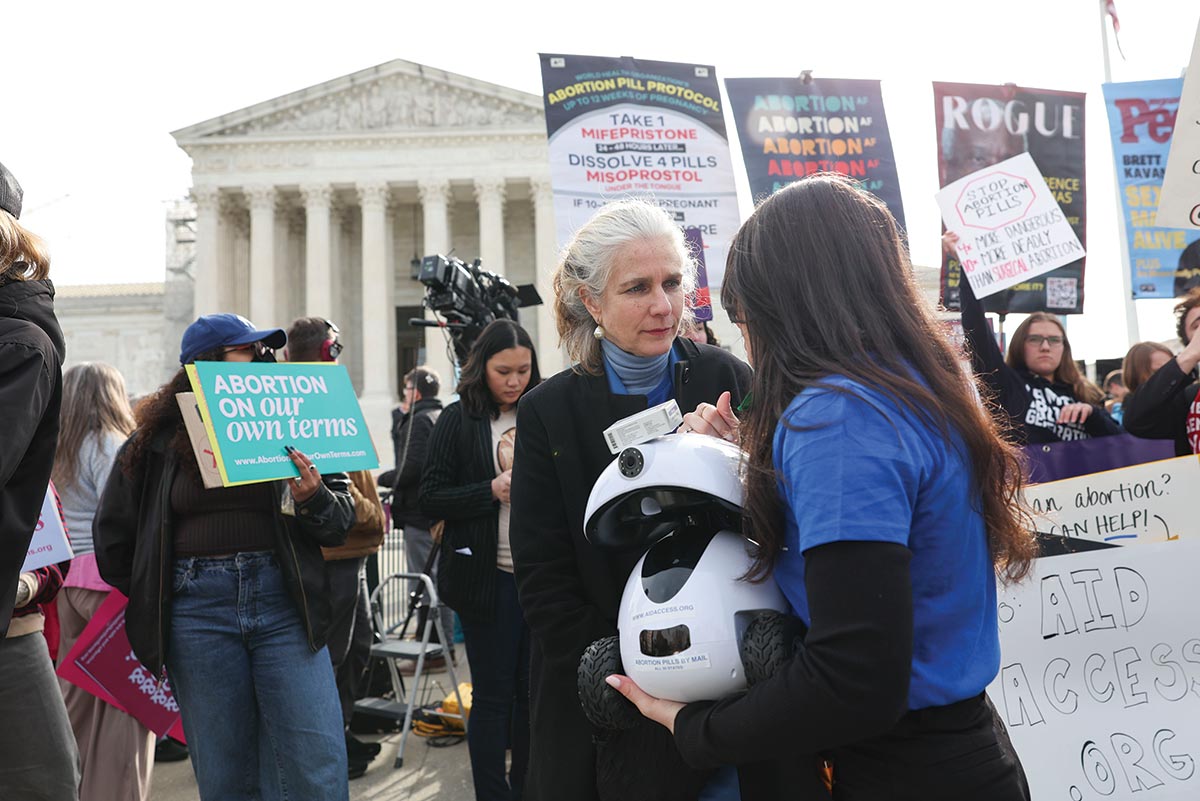
Since the Supreme Court ended the nationwide right to legal abortion with its decision in Dobbs v. Jackson Women’s Health Organization two years ago, thousands of pregnant people who wanted an abortion have instead been forced to give birth. One study last year by the nonprofit Institute of Labor Economics found that the birth rate in states with total abortion bans increased by 2.3 percent compared to states where abortion was protected, which amounts to an estimated 32,000 more births per year. The increase was especially high among Latinas, women in their early twenties, and Texans, whose average driving distance to a clinic had increased by 453 miles. Undocumented Texans in the Rio Grande Valley are cut off by Border Patrol checkpoints from states to the north where abortion remains legal. A newer study by the nonprofit public health organization KFF found that one in five women of reproductive age living in the 14 states where abortion is banned has either struggled to access an abortion because of their state’s restrictions or knows someone who has.
Yet even as tens of thousands of people have been unable to terminate their pregnancies, the number of abortions in the United States actually increased last year, in large part because of the rising availability of telemedicine abortions, reaching the highest number since 2011. A telemedicine abortion is a medication abortion provided without an in-person visit; typically, the pills are mailed to the patient after a video visit or an exchange of messages with a clinician. These options were not widely available in the United States until the pandemic, when the Food and Drug Administration eased its in-person dispensing requirement for mifepristone, the first of two medications generally used in an abortion. Some brick-and-mortar clinics began to offer telemedicine abortions, and new virtual clinics cropped up. Today, medication abortions account for 63 percent of all abortions in the formal healthcare system, up from 53 percent in 2020, according to the Guttmacher Institute.
But even that staggering shift is an undercount of medication abortion’s rise, because it does not include abortions provided in the 14 states where abortion is banned by a newer, smaller subset of telemedicine services that are willing to ship to those states. Until last summer, people in red states could obtain abortion medication online, but the logistics were far more complicated: They had to either wait weeks for their pills to ship from India, place an order from an online vendor without a consultation with a clinician, or get creative—have the pills shipped to a friend in a place where abortion was legal, for instance. That all changed after states like New York and Massachusetts passed shield laws. A limited number of providers in those states were ready to operate under these new and untested laws. Now patients in red states can get a medication abortion from a licensed provider based in the United States with just a few clicks of a mouse, entering answers to basic questions online. What’s unclear is whether the courts will allow this to continue.
In a case now before the Supreme Court, anti-abortion groups are asking it to reinstate the requirement that mifepristone be dispensed in person. (Their petition cites shoddy safety data on mifepristone that was later retracted by the journal that published it.) Last year, Texas Judge Matthew Kacsmaryk, an anti-abortion zealot who has served on the board of a Christian maternity home and was handpicked to hear the case by the anti-abortion groups, wrote in his ruling that the requirement should be reinstated. Kacsmaryk agreed with the movement’s most promising avenue for shutting down telemedicine abortion for good: He claimed that the Comstock Act, the 1873 anti-obscenity law that has been dormant for half a century, bans the mailing of abortion drugs. During Supreme Court arguments on the case on March 26, at least two justices seemed to agree about Comstock. But for now, the court seems likely to uphold access to mifepristone on the technical grounds that the anti-abortion groups lacked standing to bring the case in the first place.
Far less certain is whether the courts could eventually allow states like Alabama or Texas to extradite the providers who send pills to these states. “I think there’s a real possibility a court is going to say, ‘Well, actually, the banned state can come for you,’” Mary Ziegler, a law professor at the University of California, Davis, told me, especially given the conservative makeup of the federal courts. For that reason, she calls the work of blue-state providers operating under shield laws “the closest thing we’ve had to real civil disobedience.”
The shield-law providers I spoke with disagreed, saying that they’re operating within the law in their home states. Yet they acknowledged that providing shield-law abortions requires a tolerance for risk that most providers, clinics, and major foundations don’t have. Shield-law providers tend to avoid traveling to states like Texas, for example, lest they get picked up on an arrest warrant.
“There have been providers who have wanted to become shield-law providers and mail [abortion medication] but haven’t, because there were just things about their personal circumstances that they were unwilling to change,” Elisabeth Smith, the director of state policy and advocacy at the Center for Reproductive Rights, told me. “The same is true for organizations.”
How the law will treat patients like Kay is another open question. Arrests related to self-managed abortion are exceedingly rare, but if you happen to be singled out by a zealous prosecutor, it could ruin your life. The legal advocacy group If/When/How documented 61 cases of people, including seven minors, criminalized for self-managing an abortion or helping someone do so between 2000 and 2020, before Dobbs. Many of the women served time in jail and appeared in media reports that made them sound “like some sort of monster,” as one of them put it. Of the 42 adult cases that If/When/How was able to track that proceeded through the courts, almost a third were ultimately dropped or dismissed, and 83 percent involved laws that were not self-managed-abortion bans. Most adult cases were brought to the attention of law enforcement by a healthcare provider or someone the person knew. Only seven states have ever banned self-managed abortion explicitly, and only one of those laws remains active.
“We don’t know of someone who’s gotten into legal trouble just for the act of ordering abortion pills online,” said Elizabeth Ling, the senior helpline counsel at If/When/How. Still, Ling said, “it’s not so much the number of prosecutions that matters. It’s this persistent fear that is legitimate, because we do live in a carceral state.” For red-state patients like Kay, the telemedicine options may feel so new and the help so remote that they are gripped with anxiety that the pills won’t arrive, or that they’ll be arrested for using them. On If/When/How’s legal helpline, Ling counsels people ordering abortion pills to understand the factors that can elevate their risk, like having an abusive partner who might report them to the police.

In a light-filled apartment in upper Manhattan on a Saturday morning, Dr. Linda Prine sits barefoot in her office, reading a form submitted online by someone like Kay. She scans the patient’s responses to a series of basic questions: How did you confirm your pregnancy? How long have you been pregnant? Is the pregnancy the result of rape? How comfortable do you feel about your decision? Are you sure no one is forcing you? Are you able to get to a facility that can provide basic medical care in 60 minutes or less? The form also asks whether the patient has allergies to either of the two medications typically used to induce an abortion, misoprostol and mifepristone, or any conditions that could make it unsafe to have a medication abortion. Prine says she’s never encountered anyone with those conditions in her entire career. She takes note of how much the person paid—it might be $150, a lower amount on the sliding scale, or nothing. Then she clicks over to her prescription software and chooses the medications from a drop-down menu. The whole process takes about 90 seconds.
“So there, I just did an abortion,” she says. At times, the process can be more involved: Patients sometimes send in questions, which Prine responds to several times a day.
As she fires off prescriptions for Aid Access, which offers abortion pills to people up to 13 weeks pregnant in all 50 states, Prine is also on a shift volunteering for the Miscarriage and Abortion Hotline, which she helped launch several years ago to provide medical information and support to people who have questions while taking the pills. “The fetus is barely visible at 10 weeks; it’s like the size of your thumbnail,” Prine tells a hotline caller (to ensure confidentiality, she has AirPods in). “You’re probably not even going to see it,” she adds, her voice reassuring and warm. “It’ll come out with a big clot, and you just flush.” After listening to the caller describe her symptoms, Prine reassures her: “It sounds like everything worked.”
Supporting someone through an abortion in 2024 can be this easy: A doctor sitting in her apartment, sun streaming in through the window, the sound of someone dribbling a basketball floating up from outside, the smell of lilies from a bouquet on a table nearby. During my visit, Prine will repeatedly reassure callers from the South that everything is OK. She’ll respond to text messages, too, including from someone who is feeling light-headed. Prine tells her to drink Gatorade and chicken soup, monitor her bleeding, and check back later. Another caller says she went to the hospital after becoming dehydrated; they gave her IV fluids and sent her home. There are harder moments, like when people who are further along in their pregnancy than they thought pass a larger fetus than they expected and call Prine in a panic. While Aid Access does not ship pills to patients past 13 weeks, some Internet vendors and peer-support networks do, and their users may reach out to Prine’s hotline. But, she says, these calls have gotten less frequent now that fewer people have to wait three or four weeks for pills to arrive from abroad.
Prine and her colleagues have been laying the groundwork for this moment for years, doing research to show that it’s safe to provide a medication abortion without an ultrasound, lab work, or even a face-to-face visit. One recent study of more than 6,000 patients found that medication abortion by mail is about 98 percent effective and safe for over 99 percent of patients. Fifteen of the 6,000 patients had serious complications, including six with bleeding heavy enough to require a transfusion and two cases of infection. The pandemic provided an unexpected boost to telemedicine abortion access, prompting the FDA to suspend the in-person requirement for prescribing mifepristone. Then Dobbs lit a fire under blue-state lawmakers, who passed the shield laws that protect doctors like Prine from extradition to states like Texas. Massachusetts, Washington, Colorado, Vermont, New York, and California have passed laws that protect clinicians in those states who provide telehealth abortions to residents of states where such care is restricted. Under these laws, state officials will refuse to cooperate with any investigations or extradition attempts by the hostile states. Aid Access now has 10 providers operating under these laws within the United States, providing between 8,000 and 10,000 abortions a month nationwide.
Despite the speedy uptake of abortions enabled by shield laws, only a small number of organizations provide them. No brick-and-mortar clinics are shipping pills to states where abortion is banned; nor are most of the telemedicine start-ups. So far, just three US-based telemedicine services are mailing to the most restrictive states: Aid Access, Abuzz, and The MAP, the latter run by Cambridge Reproductive Health Consultants in Massachusetts. “Between institutional skittishness and the conservativism of medicine as a field, those two things are not working in our favor right now in moving innovative strategies forward,” Dr. Angel Foster, a cofounder of The MAP, told me. Clinics have formed the backbone of the reproductive health movement for the past 50 years, and Foster agrees they must remain open, not only because some patients prefer an in-person procedure or need one for medical reasons, but because clinics often provide services that you can’t get online. But when it comes to the simple act of getting abortion pills into people’s hands, it’s much easier to ship pills from a blue state to a red one than to force a patient to take that journey in reverse.
Julie F. Kay, an attorney who cofounded the Abortion Coalition for Telemedicine with Prine and Dr. Maggie Carpenter, said they launched the organization because they weren’t getting enough support on telemedicine shield laws from mainstream groups. Few “of the traditional reproductive rights or pro-choice organizations were interested in making shield laws a priority,” Kay told me. That leaves people who need an abortion vulnerable, she said. “If we don’t support those who are taking the risk to provide services, whether through telemedicine shield laws or other practices, we’re simply shifting the risk onto the patients, and onto the most marginalized women and pregnant people who don’t have the money to travel or who are more subjected to a racist criminal justice system.”
Prine is no stranger to taking on legal risks. Movement attorneys balked at endorsing her Miscarriage and Abortion Hotline, the information and support line she cofounded in 2019. “We were pretty much universally advised not to do this,” Prine told me. But the need was clear. Today, the M+A Hotline has 80 volunteers who answer calls from 8 am to 1 am Eastern time every day of the week. It’s so much in demand that even brick-and-mortar clinics and Planned Parenthood affiliates refer patients to it.
In her sunny apartment, the phone rings again. “Just as far as the finger can reach,” Prine tells a young man calling from a Southern state. “After half an hour, it’s OK to get up and walk around.” She hangs up and smiles. “I love it when the guys call,” she tells me. “This poor guy’s trying to ask me how far in the vagina the pills have to go.” The calls come in back-to-back, but Prine remains calm and reassuring. Earlier in the day, a caller had made her laugh. “You sound like my grandmother,” the young woman told her. Prine is a grandmother, 72 years old, with a jigsaw puzzle on the table by the window, a list of exercises on the couch from a physical therapist, and pictures of her grandchildren on the fridge. “Straightforward,” the young woman had called her.
Since the Dobbs ruling, abortion funds—groups that raise money for procedures and transportation for people needing abortions—have been working full tilt, too. In the first year after Dobbs, these funds spent nearly $37 million to help abortion seekers, including $10 million to pay for abortion-related travel and other practical needs. Their focus remains getting patients from red states to blue states where they can get an abortion in a clinic. Many abortion funds, especially those in states that have now banned abortion, fear that it’s too risky to fund abortions accessed through shield laws. Texas law allows private citizens to sue anyone who “aids or abets” an abortion after six weeks. So the Frontera Fund, an abortion fund in South Texas, will pay for abortions in out-of-state clinics, but considers it too risky to pay for telemedicine abortions in Texas or even travel costs for most Texans, a reality that the fund’s executive director, Zaena Zamora, says is “incredibly frustrating.” “Especially living in the Rio Grande Valley, geographically we’re the farthest away from any safe state,”Zamora says. “We want to be able to help other Texans…and we’re having to depend on funds in other states to kind of pick up where we can’t.”
But legal risks are not the only reason abortion funds are still shelling out so much money to help people travel to abortion clinics. Some people benefit from in-person care and from contact with an abortion fund, said Oriaku Njoku, the executive director of the National Network of Abortion Funds.
“Someone might need someone to talk to, someone who sounds like them, who looks like them, who’s maybe experienced the same thing, to be able to let them know that they’re not alone in this process,” Njoku said. In addition, online-only options may not work for “someone who’s still being impacted by the digital divide.”
Popular
“swipe left below to view more authors”Swipe →Abortion funds have more to offer than just money—they also help allay the fear and isolation many abortion seekers feel in the post-Dobbs era, Njoku said. “There’s more than just funding that goes into providing care for people seeking an abortion in this moment.”
Some abortion funds have gotten on board with funding abortions through shield laws. Susan Yanow, a longtime activist who works with The MAP, has recruited 12 abortion funds based in both red and blue states to support the group’s telemedicine work, including Cobalt in Colorado, where one of the Aid Access providers is based. The MAP charges $250 but offers a sliding scale. About a third of patients pay $5 or less. One paid $9.22 for her abortion. “To me, that was heartbreaking,” Foster said. “It’s such a specific amount… in my mind, I see someone counting out their pennies on a kitchen table.” Still, when The MAP gets a query from someone in a state where abortion is legal, they send an autoreply directing them to sites where they can find clinics in their area. “We don’t want to undermine clinics,” Foster said.
Kay began to get nervous after ordering the pills from Aid Access. She was nine weeks pregnant and decided that she needed a backup plan in case the pills never arrived. So she ordered another set from Las Libres, an organization founded by activists in Guanajuato, Mexico. The pills from the two services happened to come on the same day—nine days after Kay began the Aid Access intake and a week after she placed her order with Las Libres. Inside each package were the pills Kay needed to end her pregnancy.
Obtaining pills from friends or activists rather than licensed medical providers recalls the early days of medication abortion, which was promulgated at first not by doctors but by women who needed abortions. When the ulcer drug misoprostol hit the market in Brazil in the 1980s, women read the warning on the box that said it could cause a miscarriage and started to use it to end unwanted pregnancies. Women all over the continent used it for hundreds of thousands of abortions before the authorities caught on. Meanwhile, French scientists were experimenting with a drug called mifepristone that seemed to make misoprostol more effective. After mifepristone was approved in France, activists in the United States inundated the French pharmaceutical company Roussel Uclaf with petitions demanding that the drug be exported here. In 1988, threats from US anti-abortion groups prompted the company to suspend distribution of the drug in France. The halt lasted two days before French Health Minister Claude Évin ordered mifepristone back on the market, calling it “the moral property of women.”
It took another 12 years for the FDA to approve the drug for use in the United States, and even then the agency did so with onerous requirements, such as the rule that it be dispensed in person. In countries around the world where abortion is restricted, medication abortion remains banned or simply hard to access. But in these places, as in the United States, networks circulate abortion pills through a supply chain that begins with generic medications produced for pennies in India.
“There’s thousands of us, everywhere,” one activist who is part of a community support organization based in the southern United States told me. People find their way to her by word of mouth or via listings on websites like PlanCPills.org. All she needs is an address, not even a real name, and her network will ship abortion pills from more than 20 different distribution centers, which range from the home of a woman in her 70s in Texas to more sophisticated pill-packing operations. Unlike Aid Access, the community support network does not do any medical screening or impose any gestational limits. For the less common cases where a person is over 20 weeks, the network will assign a trained doula to be in contact with the person via an encrypted chat channel. Last year, the group helped 28,000 people in abortion-restrictive states. To their knowledge, none of those people were investigated. Some of their packages were intercepted, but it hasn’t stopped them. “I think the bottom line is: There is absolutely no reason why there should be forced birth in this country or in any country,” the activist told me. “Abortion should be free and available to everybody. And now we can do that.”
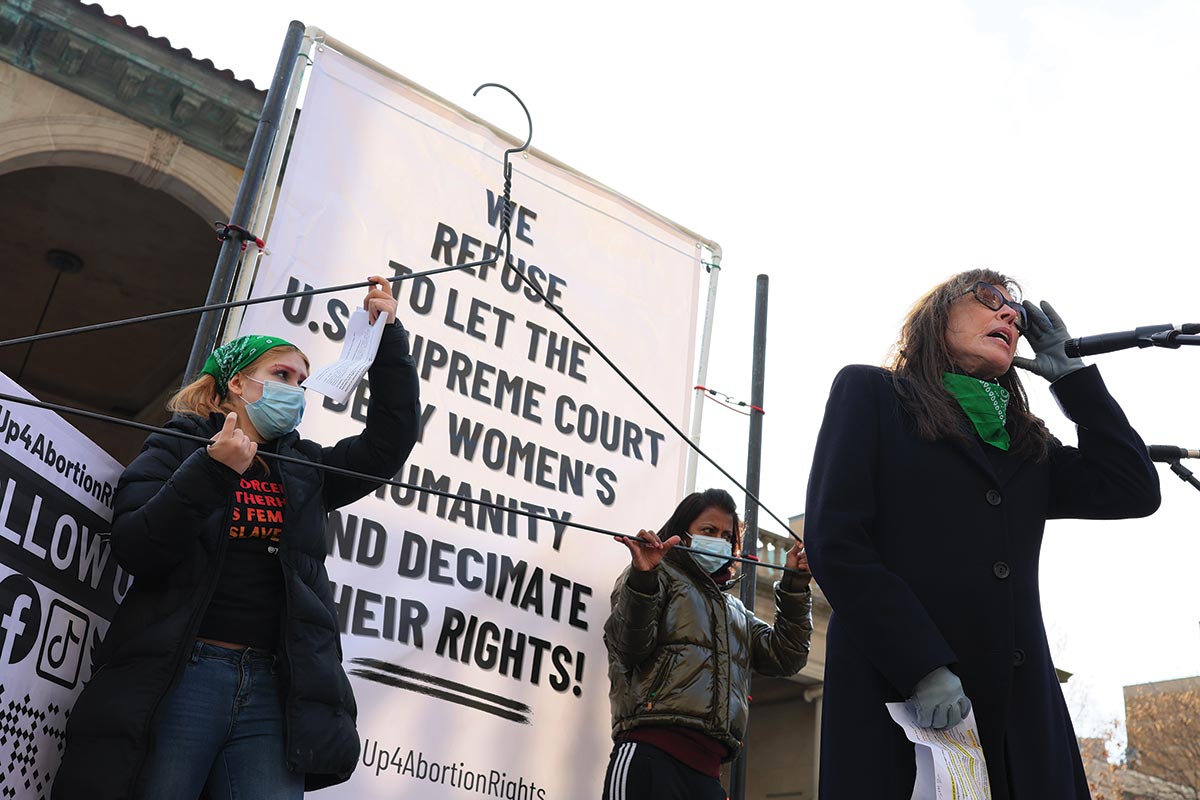
In New York City in the early 1970s, it was abortion clinics that were the hot innovation. The state had legalized abortion in 1970, before most other states, and feminists like Merle Hoffman were opening clinics to receive patients from all over the country who were descending on the city. Now 78, Hoffman is a petite woman with a mane of dark brown hair and high cheekbones. In her office, she sits next to a seven-foot-long metal coat hanger that she likes to brandish at protests to remind people of the bad old days, when countless women were dying entirely preventable deaths from self-induced or back-alley abortions. Hoffman has run Choices Women’s Medical Center, a clinic in Queens, for 53 years. Beyond the door, in the waiting room, 14 women sit in silence, staring at their phones. A receptionist calls them up to the desk one by one, using numbers rather than names. On the wall hangs a billboard-size mosaic of Wonder Woman made by an artist friend of Hoffman’s. A television screen flashes information about birth-control methods. People from Texas, Georgia, and other Southern states have passed through this room after long journeys north, often with the help of multiple abortion funds. Sometimes it takes so long to get the money and arrange the travel that they are pushed further into pregnancy, which means that their procedure might take two days instead of one.
When their number is called, they will have blood drawn and get a sonogram. Every patient meets with a licensed social worker before their abortion. Rebecca Glassman, the social work supervisor, said one benefit of in-person care is that the patient has the chance to divulge domestic abuse in a safe and confidential environment; she’s seen patients go straight from the clinic to one of the city’s family justice centers for help.
“I think the first thing that comes to mind is, if there’s any sort of privacy- or safety-related issues, it’s really helpful for the patient to be here and not in their home,” Glassman says. Wearing blue scrubs, she sits in a small counseling room with posters about cancer detection in English and Spanish displayed on the wall behind her. “If you’re able to come into the office, you’re going to just get a more personalized experience…. If you’re sitting down with a social worker…we read body language, and we just kind of like can feel each other’s energy.”
Hoffman points out that the online platforms are helpful “only up to a certain gestation. And then there’s issues of no sonograms, and then no follow-up visits.” She adds, “Having gone through all of the licensure that I have necessary for this clinic, I would like to see very internally strong standards of excellence, to see the highest standards of care. But when you don’t have that, you do what you can do.”
The clinicians providing medication abortion by mail say sonograms and follow-up visits are not necessary in most cases—and their research bears this out. But this approach doesn’t work for every patient; plenty of people still prefer or need in-clinic abortions, especially those who are in their second or third trimester. “There’s just not enough care,” said Erin Grant, a co–executive director of the Abortion Care Network, a network of independent clinics. “We don’t see medication abortion as the silver bullet to pregnancy management. It’s a part of a big ecosystem, and we actually need everything.”
The fast-moving landscape demands multiple backup plans. “We can’t just rely on Aid Access using shield laws,” said Elisa Wells of Plan C, an organization that advocates for easier access to abortion pills, because what if the Supreme Court reinstates the in-person requirement for prescribing mifepristone and they must go back to shipping pills from India or prescribing the less effective, more painful regimen of medication abortion without mifepristone?
Kay took her pills without any complications. The day after they had arrived, she had gone back to Reddit to tell her story. She wanted people facing a similar situation to know they had this option, even if they had no money and were living in a red state. “There’s a helpful community looking out for women still,” she told me, made up of “the organizations sending these pills, as well as other women like me who have had to use them before.”
Thank you for reading The Nation!
We hope you enjoyed the story you just read, just one of the many incisive, deeply reported articles we publish daily. Now more than ever, we need fearless journalism that moves the needle on important issues, uncovers malfeasance and corruption, and uplifts voices and perspectives that often go unheard in mainstream media.
Donate right now and help us hold the powerful accountable, shine a light on issues that would otherwise be swept under the rug, and build a more just and equitable future.
For nearly 160 years, The Nation has stood for truth, justice, and moral clarity. As a reader-supported publication, we are not beholden to the whims of advertisers or a corporate owner. But it does take financial resources to report on stories that may take weeks or months to investigate, thoroughly edit and fact-check articles, and get our stories to readers like you.
Donate today and stand with us for a better future. Thank you for being a supporter of independent journalism.
Thank you for your generosity.
More from The Nation

4-Day School Weeks Are a Raw Deal for Kids—and Their Parents 4-Day School Weeks Are a Raw Deal for Kids—and Their Parents
The money-saving measure happening in districts throughout the country leaves too many kids without anything to do—or in some cases, anything to eat.

Drawing the 1968 Columbia Protests Drawing the 1968 Columbia Protests
I sketched the student protests at Columbia University nearly 60 years ago. Here is what I saw.
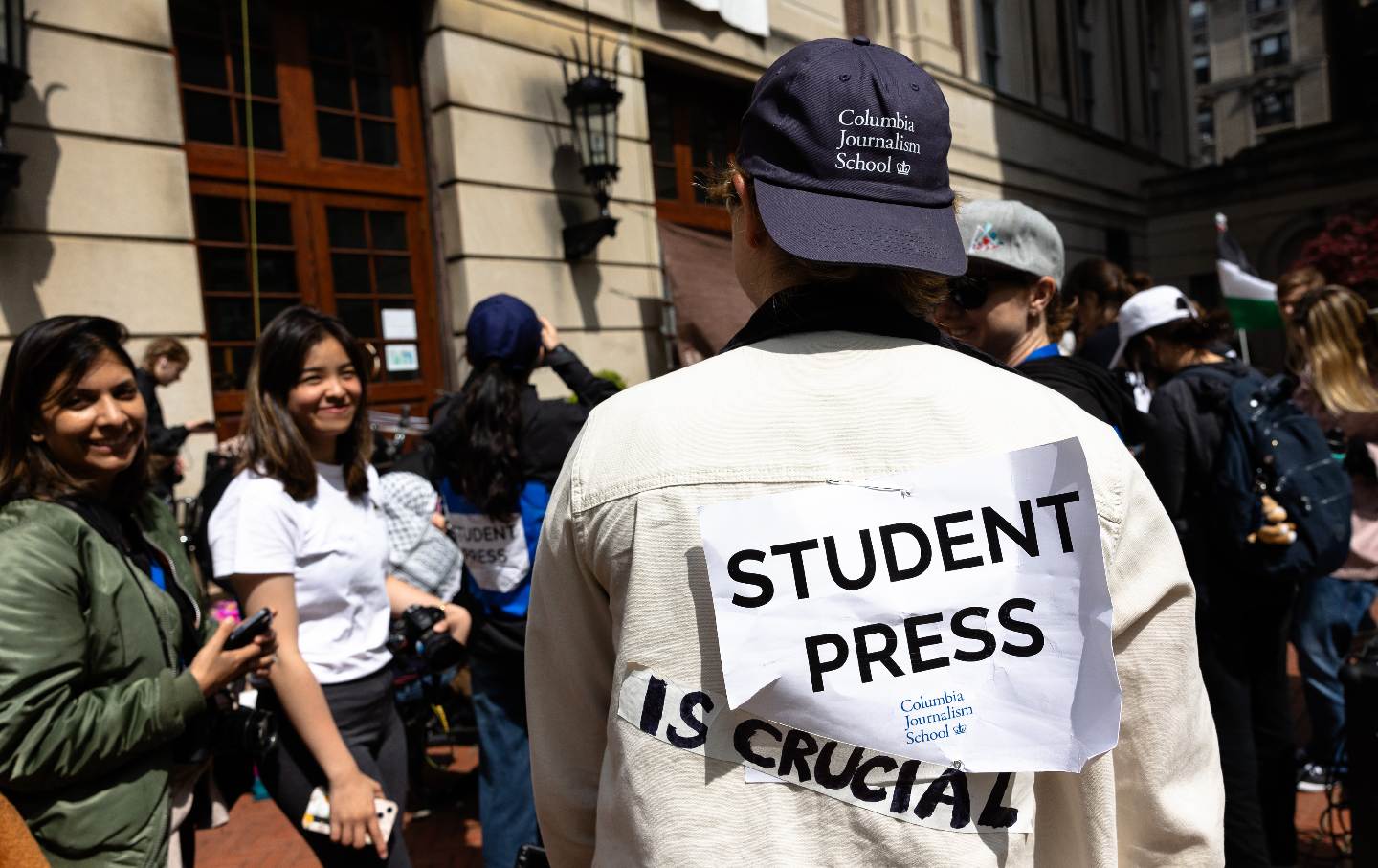
What Student Journalists at Columbia Really Learned What Student Journalists at Columbia Really Learned
In the classroom, professors taught the importance of the free press, at the same time as the administration stifled the work of student journalists and intimidated them through t...
StudentNation / Anna Oakes, Indy Scholtens, Emily Byrski, Angelica Ang, Claire Elana Davenport, and Fahima Degia

Harrison Butker Is a Jerk, a Bigot, and a True Representative of the NFL Harrison Butker Is a Jerk, a Bigot, and a True Representative of the NFL
In a brief commencement speech, the Kansas City kicker managed to be racist, sexist, and homophobic. The NFL’s response is revealing.

The Gaza Crisis We’re Not Talking About The Gaza Crisis We’re Not Talking About
There is disturbing evidence of a sustained Israeli campaign of sexual violence against men and boys.
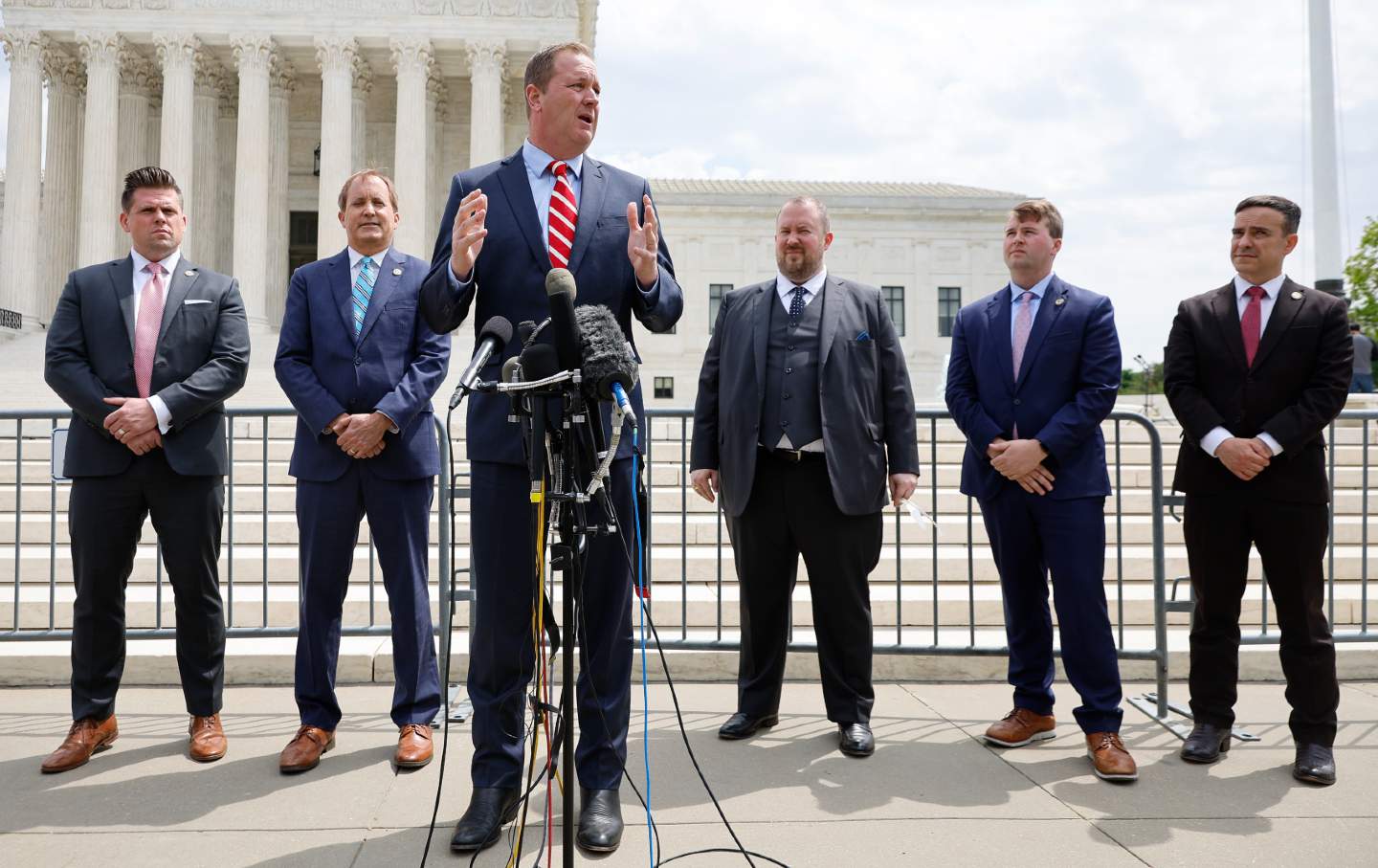
Meet RAGA—One of the Scariest GOP Groups You’ve Never Heard Of Meet RAGA—One of the Scariest GOP Groups You’ve Never Heard Of
The Republican Attorney Generals Association is waging a legal war to overturn reproductive rights, LGBTQ rights, and climate regulations, one state at a time.


